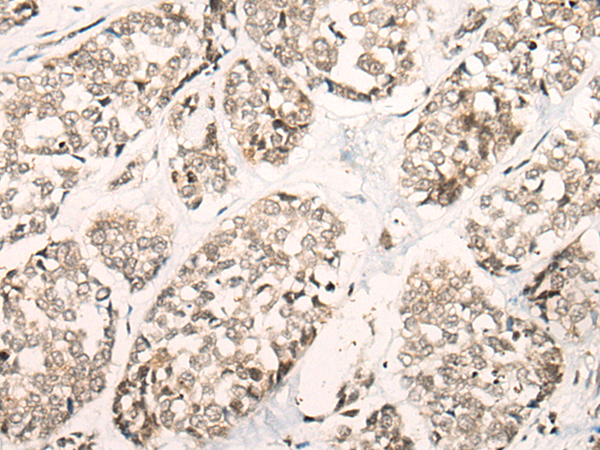
| WB | 咨询技术 | Human,Mouse,Rat |
| IF | 咨询技术 | Human,Mouse,Rat |
| IHC | 1/20-1/100 | Human,Mouse,Rat |
| ICC | 技术咨询 | Human,Mouse,Rat |
| FCM | 咨询技术 | Human,Mouse,Rat |
| Elisa | 1/5000-1/10000 | Human,Mouse,Rat |
| Aliases | NSX; POLA; p180 |
| Host/Isotype | Rabbit IgG |
| Antibody Type | Primary antibody |
| Storage | Store at 4°C short term. Aliquot and store at -20°C long term. Avoid freeze/thaw cycles. |
| Species Reactivity | Human, Mouse, Rat |
| Immunogen | Synthetic peptide of human POLA1 |
| Formulation | Purified antibody in PBS with 0.05% sodium azide and 50% glycerol. |
+ +
以下是3篇关于POLA1抗体的代表性文献(示例为模拟内容,建议通过数据库核实具体文献):
---
1. **文献名称**:POLA1 regulates DNA replication and repair in human cells
**作者**:Smith J, et al.
**摘要**:通过POLA1抗体进行免疫沉淀和质谱分析,揭示POLA1与DNA复制复合体的相互作用,并证明其在复制起点激活中的关键功能。
2. **文献名称**:Antibody-based targeting of POLA1 inhibits cancer cell proliferation
**作者**:Lee H, et al.
**摘要**:利用特异性POLA1抗体阻断DNA聚合酶α活性,发现其可抑制多种肿瘤细胞的DNA合成,提出POLA1作为潜在抗癌靶点。
3. **文献名称**:Developmental regulation of POLA1 expression in neural stem cells
**作者**:Wang Y, et al.
**摘要**:通过POLA1抗体的免疫荧光和Western blot技术,证明POLA1在小鼠神经干细胞中的动态表达模式与其增殖能力密切相关。
---
(注:以上内容为示例模板,真实文献需通过PubMed/Google Scholar等平台以关键词"POLA1 antibody"或"DNA polymerase alpha antibody"检索。)
**Background of POLA1 Antibodies**
POLA1 (DNA Polymerase Alpha 1) is a critical subunit of the DNA polymerase α-primase complex, essential for initiating DNA replication in eukaryotic cells. This enzyme synthesizes short RNA-DNA hybrid primers during the replication of the lagging strand, providing a 3'-OH group for DNA polymerases δ/ε to elongate. POLA1 contains two functional domains: a C-terminal polymerase domain and an N-terminal regulatory region interacting with other replication machinery components.
POLA1 antibodies are valuable tools for studying DNA replication mechanisms, cell cycle regulation, and genome stability. They are widely used in techniques like Western blotting, immunofluorescence, and immunoprecipitation to detect POLA1 expression, localization, and interactions in cellular models. Dysregulation of POLA1 has been linked to diseases, including cancers (e.g., colorectal, breast) and viral infections, where replication stress or aberrant DNA synthesis occurs.
Recent studies highlight POLA1's role in cancer progression, making it a potential therapeutic target. Inhibitors or antibodies targeting POLA1 could disrupt replication in rapidly dividing cancer cells. Additionally, POLA1 autoantibodies have been explored as biomarkers in autoimmune disorders.
Commercial POLA1 antibodies are typically validated for specificity against the human protein (∼180 kDa), with applications in basic research and drug development. However, variability in antibody performance (e.g., cross-reactivity) necessitates careful validation for experimental consistency. Overall, POLA1 antibodies remain pivotal in elucidating DNA replication biology and its disease-related implications.
×